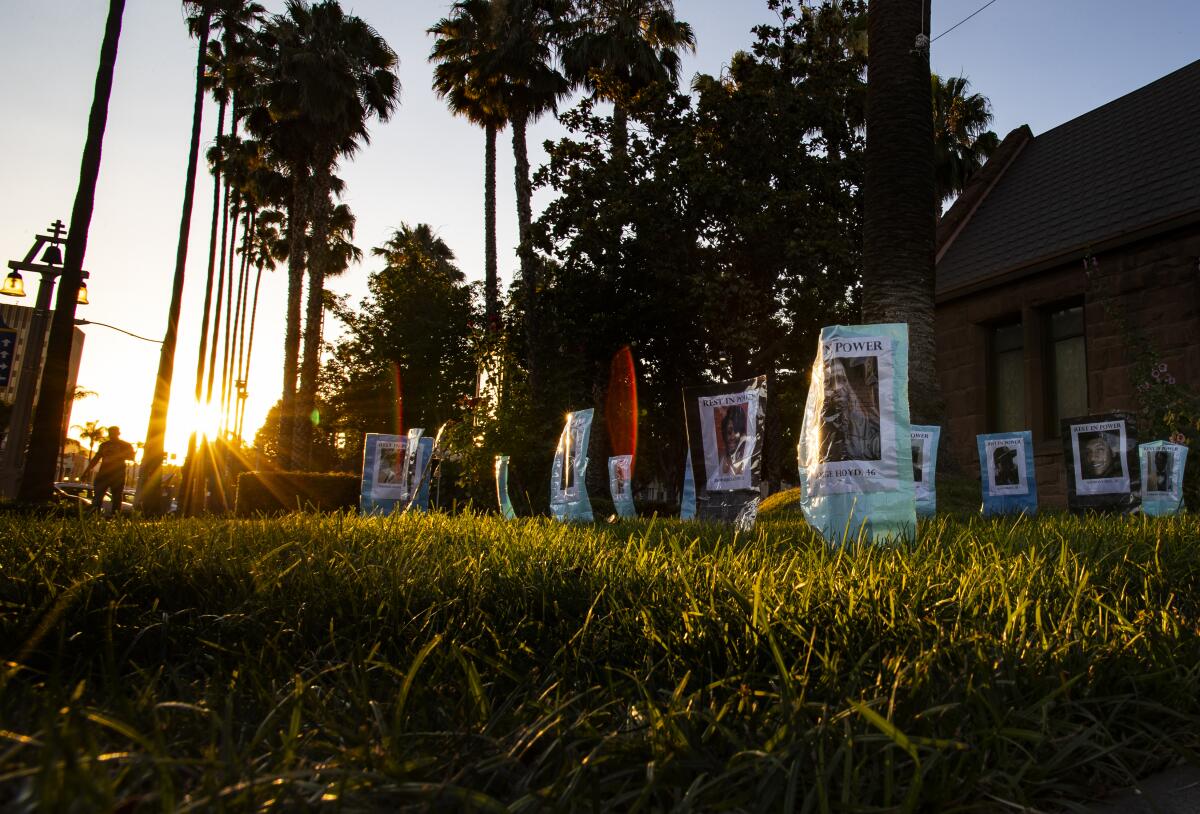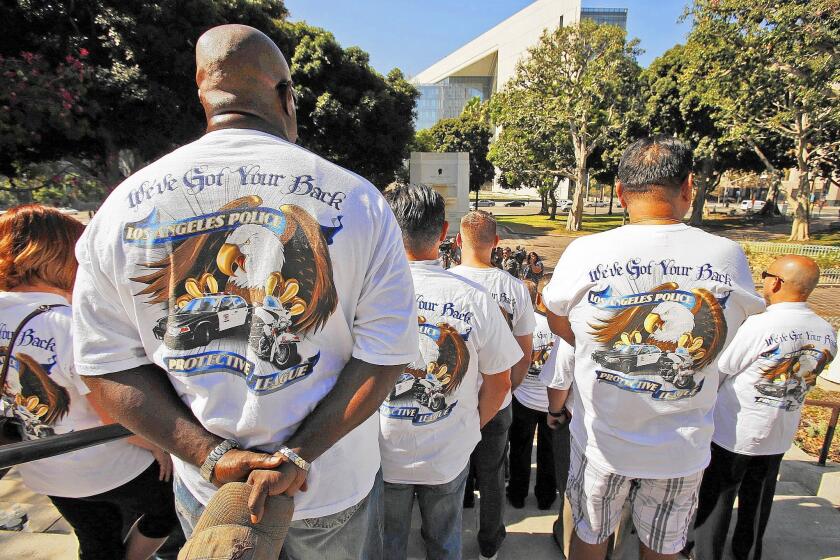Police unions see their clout crater amid protests, but for how long?

For decades, law enforcement unions in California have held powerful sway over local and state politicians, wielding the cash and clout to punish those who crossed them and to reward those who didn’t.
Their often pugnacious style of politics was on display in Los Angeles recently, when officers, including a union board member, berated Councilwoman Monica Rodriguez over proposals to redirect some law enforcement funding and threatened to take their anger to the ballot box.
In San Francisco, a union leader suggested that city bus drivers, who rely on police when safety issues arise, “lose our number” after the transportation agency said it would no longer carry officers to protests against police brutality.
But in a reversal that largely began in 2018 with the death of a Black man, Stephon Clark, at the hands of Sacramento police and came to a peak in May with the killing of George Floyd in Minnesota, the power of California’s police unions has been severely diminished.
Even once-staunch allies are distancing themselves at a time when the future of the profession is being reimagined by city councils, supervisor boards and the state Legislature.
“The consensus feeling is there has been an abandonment by the majority of our elected officials, and a lot of the community members who supported us are being silent right now,” said Brian Marvel, president of the Peace Officers Research Assn. of California, which lobbies for officers at the Capitol. “They are saying we are toxic and no one wants to talk to us.”
It is a shift that many say is long overdue and vital to restoring trust in public officials with varying degrees of power over law enforcement, but it has left union leaders fearing they will be left out of conversations about their own future.
For politicians intent on criminal justice reform, it’s a window of opportunity to move forward on changes that only a few months ago would have been unimaginable.
“The mood has changed,” said state Assemblyman Kevin McCarty (D-Sacramento), who has two police reform measures gaining traction this year after previous defeats — including one that would increase the state attorney general’s involvement in investigations of in-custody deaths. “Even law enforcement knows they need to get out of their comfort zone and push some reforms.”
Liberals have long been friends to organized labor. But many now see police unions as an enemy, quashing reform and shielding problem officers.
The large sums of campaign money police unions contribute also is under increasing scrutiny.
Some elected officials are pushing for a ban on contributions from law enforcement in certain races, or for returning contributions that previously were made. Removing the financial power of police, especially from local elections, would increase community trust, they say.
Tori Verber Salazar, the Republican district attorney for San Joaquin County, recently joined current and former Democratic district attorneys in calling on the State Bar of California to prohibit those seeking public prosecutor roles from taking political or financial support from law enforcement unions, because they determine if officers are charged after deadly force is used.
Another district attorney making the plea, San Francisco’s Chesa Boudin, faced more than $600,000 in spending against his campaign from law enforcement unions that fear his liberal policies, including promises for more police accountability in use-of-force cases.
Verber Salazar said when she ran for office in 2014, “the first thing everyone told me is you have to get law enforcement’s endorsement, and so I did.”
But after winning, she said, she slowly realized “this is at a minimum a perceived conflict and probably a true conflict.”
Verber Salazar, who is trying a felony manslaughter case against a Stanislaus County sheriff’s deputy who shot a bipolar woman in her car after a slow-speed chase, said prosecutors already face pressures — and often anger — when investigating local law enforcement conduct because they work closely with police and sheriffs.
Taking money adds an unnecessary burden to that relationship, she said, but charging officers must be on the table when circumstances demand it.
While the idea of holding officers accountable for misconduct is simple, the reality has not been. For years, union contracts for officers and deputy sheriffs have solidified arbitration rules and hurdles that can stymie disciplinary action.
Police unions “are different from other labor organizations,” said state Sen. Holly Mitchell (D-Los Angeles), who has sparred with police unions many times over criminal justice legislation. “Their work to protect their interests is sometimes counter to [that of] the general public.”
Fights over problematic officers are often key battlegrounds. When reformers lose those battles, it sends a signal that rank-and-file officers are not accountable.
“Culture will eat policy for lunch every day,” said Rick Braziel, a former Sacramento police chief who serves on the state’s training commission for law enforcement.
For pro-reform chiefs and local governments, the inability to remove or punish officers without a protracted and unpredictable fight is a formidable roadblock.
Marvel, the head of the state lobbying organization, sees it as a necessary check. “We don’t protect bad cops; we protect due process rights,” he said.
Chris Magnus, the former police chief in Richmond and current chief in Tucson, said that as a reform-minded leader, he has found the contract rules make it “ridiculously hard” to discipline officers.
But ultimately, he said, unions “only have as much power as elected leaders at various bodies give them.”
The clout of police unions in California began to crack at the state Capitol two years ago, as civil unrest surrounding the death of Clark — shot by police who mistook his cell phone for a gun — tapped into a collective outrage over years of killings of Black men by police. Spurned reform ideas from past legislative sessions gained acceptance from lawmakers as hallways crowded with impassioned activists.
In the aftermath of several controversial police shootings in California, activists and victims’ families have hoped their anguish would lead to action.
Two bills came to the forefront and eventually were enacted, despite law enforcement opposition to their original versions.
One, Assembly Bill 392, updated the state’s rules for when deadly force can be used. Police ultimately did not oppose that measure after its language was softened. The second measure, Senate Bill 1421, which opened a small slice of police misconduct records to the public, was a different matter, with law enforcement vehemently fighting it.
As pressure for reforms has grown to include current ideas like defunding police, union leaders — many of whom say they are not against improving policies — are seeking to reposition themselves for a seat at a table they once dominated.
Braziel said he sees a split within California’s police unions between those who are taking a more progressive, business-oriented view of the current crisis and those stuck in old ways. He sees some unions using the moment to embrace ridding the ranks of troublesome officers.
“The progressive ones are basically saying it’s a business, and we don’t want bad cops in the business,” Braziel said.
Last week, unions representing officers in Los Angeles, San Jose and San Francisco took out full-page newspaper ads, including in The Times, to call for reforms. One would require the completion of all internal affairs investigations, even if an officer resigns — a move that could allow for better tracking of problem personnel who move from department to department.
Union leaders also point out that the current idea of having someone besides an officer respond to calls such as mental health checks is one for which they have advocated, with little success.
“I have been pushing that for 10-plus years,” Marvel said.
But Tom Saggau, a spokesman for the Los Angeles Police Protective League and other police unions, said that instituting quick reform without police input could have unintended consequences. He pointed to areas like domestic violence, where some reform activists have suggested that an armed police response is unnecessary. Saggau and other experts said those calls are some of the most unpredictable and volatile.
“So, you are going to send someone with a clipboard and a white coat to say, ‘Hey, I’m here to help?’” he asked. “That is a recipe for disaster.”
Some union leaders have signaled that much of their pushback in the near future likely will revolve around protecting jobs, a reality that appeals to politicians who fear that fewer cops will mean more crime.
Few significant police reform measures have been introduced in the Legislature so far this year, in part because of the havoc caused by the COVID-19 pandemic. Jack Glaser, a public policy professor at UC Berkeley, said he believes local government is “where the action is going to be.”
Rodriguez, the L.A. councilwoman, said she has not spoken with the union since being lambasted by officers. But she believes reform will require everyone being at the table.
“If I didn’t want people to yell at me,” she said, “I sure as hell wouldn’t have taken a career in politics.”
More to Read
Get the L.A. Times Politics newsletter
Deeply reported insights into legislation, politics and policy from Sacramento, Washington and beyond. In your inbox three times per week.
You may occasionally receive promotional content from the Los Angeles Times.












